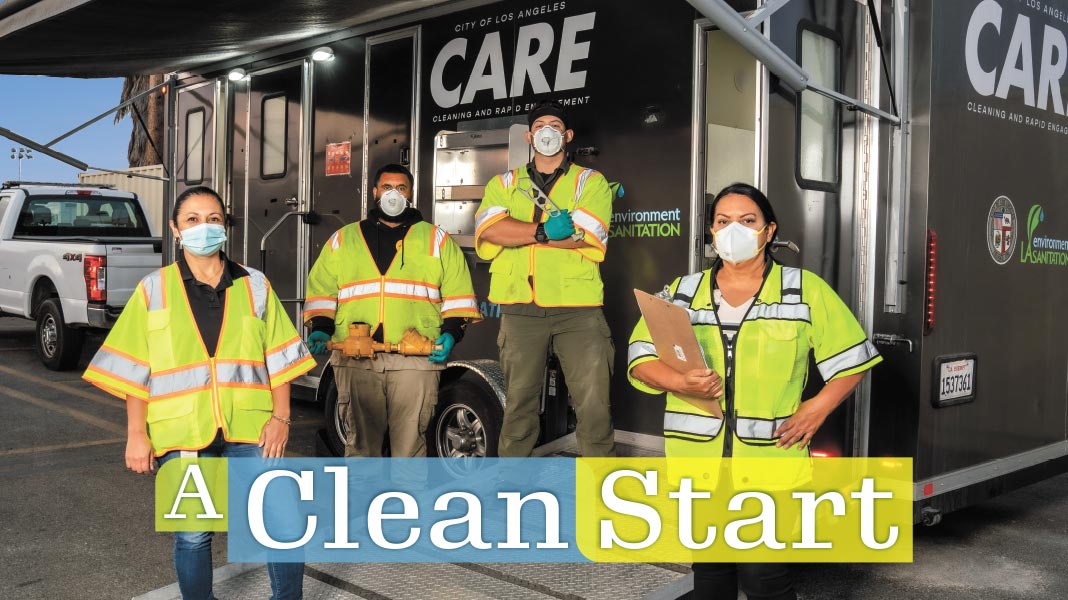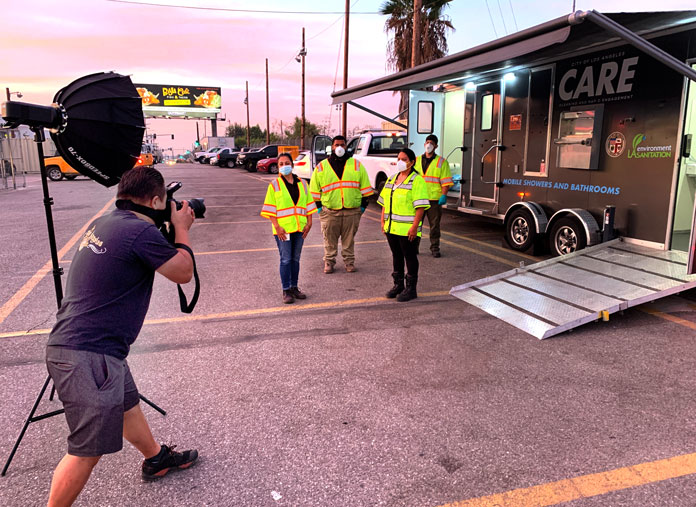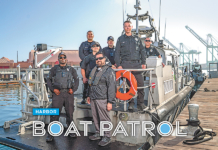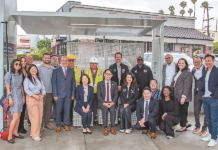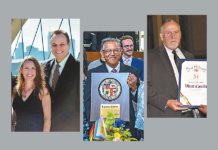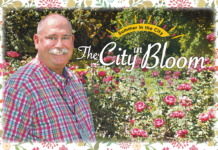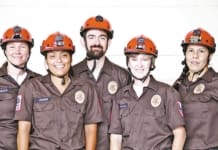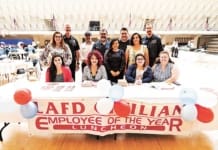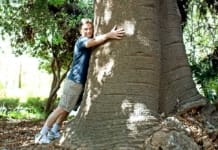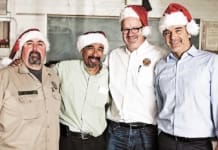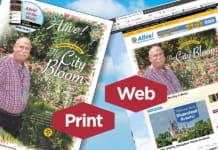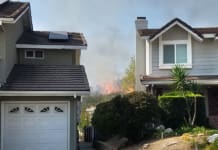Photos by Summy Lam, Club Director of Marketing;
Alive! editor John Burnes; and courtesy
Sanitation and Environment
Celebrating its first year, Sanitation’s Mobile Hygiene Unit provides showers and toilets to LA’s unhoused, giving them hope, dignity and a chance at a new life.
In October 2019, Mayor Eric Garcetti launched the CARE – Cleaning and Rapid Engagement – teams as part of a wraparound approach to service for unsheltered residents in Los Angeles. The approach put more “boots on the ground” and teamed service providers handling outreach and engagement with LASAN teams. Each CARE team is assigned to a Council District, and the regular service by the same team creates a relationship between the unsheltered residents and the staff
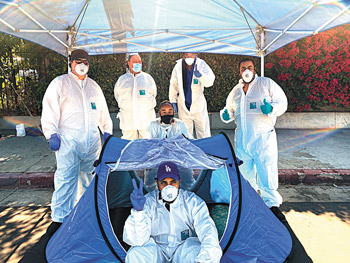
CARE includes Sanitation’s Mobile Hygiene Units, which park in areas heavily trafficked by LA’s shelterless populations and provide scheduled services including bathrooms, showers, clean clothes and tent exchanges.
The CARE team started with one hygiene trailer, all it could get its hands on at the time. The team has six now, and seven more custom-designed units are on the way before the end of the year.
The Mobile Hygiene Unit, consisting of 20 City employees, with additional services contracted to Urban Alchemy, has now provided nearly 18,900 showers to homeless LA residents.
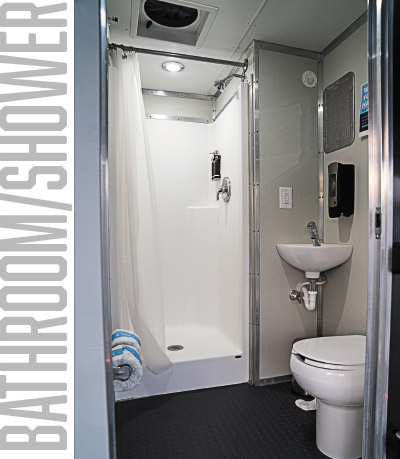
But it’s more than just hygiene. As Superintendent Jonelle Gardea, Club Member, mentions in this month’s interview, the team provides hope for many caught in persistent homelessness. A regular shower and change of clothes, provided by those they can trust, is sometimes the first step toward securing their own shelter or even a sustaining job.
As the team passes its one-year anniversary, Jonelle and Supervisor Maldonado, Club Member, talk about its successes, its national leadership, how they’re dealing with the COVID-19 crisis, and how they’re managing the unit’s dramatic growth.


Shower the People
On Tuesday, Oct. 6, Club COO Robert Larios and Alive! editor John Burnes interviewed Jonelle Gardea, Solid Resource Superintendent, 25 years of City service, Club Member; and Danie Maldonado, Refuse Collection Supervisor, 18 years, Club Member. The subject was the Mobile Hygiene Unit – the bathroom/shower trailers that provide those services (and more) to LA’s unhoused communities. The interview took place in Sanitation and Environment’s Cazador Yard on N. San Fernando Road in Glassell Park.
Both Jonelle and Danie are second-generation City employees and Club Members. The interview and field visit were socially distanced.
Alive!: Thanks for joining us today to talk about Sanitation’s Mobile Hygiene Unit. Tell us about your careers – how did you get here?
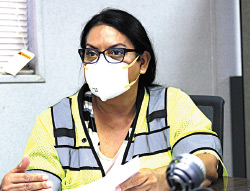
Jonelle Gardea: I started off as a Clerk Typist in 1995. I was promoted to Senior Clerk in 1997 and then to a Refuse Collection Supervisor in 2007, and then to a Solid Resources Superintendent in 2018. That’s all in the Bureau of Sanitation.
Danie Maldonado: I began my career in 2003 as an exempt Maintenance Laborer. I transitioned into a Maintenance Laborer, a regular appointment, and spent about five years there. I became a Refuse Collection Truck Operator in the West L.A. District working for Jonelle. I spent about five years there and ended up getting promoted into a Refuse Collection Field Instructor where I was there for approximately four years. Then I was promoted into a Supervisor three years ago.
And you both come from City employee families.
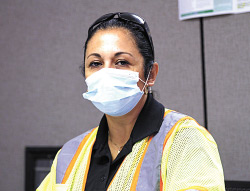
Danie: Right. My dad retired about five years ago and loves looking through Alive! every month, saying, “Hey I know him!”
Jonelle: Her dad hired me.
Really?
Danie: Yes. I’m a second-gen baby.
Jonelle: Me, too.
Danie: My dad worked for the City for 41 years.
What was his name?
Danie: Victor Orosco.
Also in Sanitation?
Danie: Yes. He retired about five years ago.
You’re second generation too, Jonelle?
Jonelle: Right. My dad, Jim Miranda, spent 34 years at Rec and Parks. He retired about 10 years ago.
Great to know!
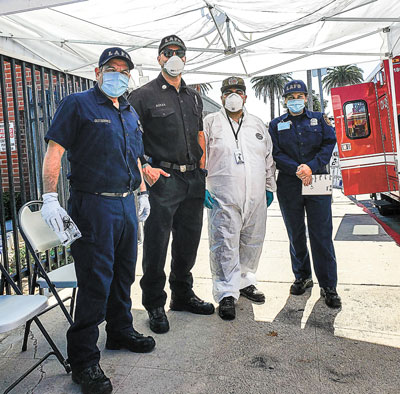
Mobile Hygiene
Tell us about the Mobile Hygiene Unit. It’s a part of Sanitation’s Livability Services, right?
Jonelle: Yes. LA Sanitation’s Livability Services Division provides services focused on protecting the public health and the environment. These programs include the Mobile Hygiene Unit, the Clean STAT Street Indexing Program, the Public Receptacle Program and of course our Comprehensive Cleaning and Rapid Engagement Team – our CARE Teams. All of these programs work under the Division of Livability Services.
Got it. So tell us what the Mobile Hygiene Unit does.
Danie: We service six locations per day and provide restrooms, showers, clean clothing, hygiene kits, a tent exchange, and limited COVID testing through a partnership with the LAFD for unsheltered Angelenos on site
What’s the tent exchange?
Danie: We have a tent exchange program where if they do not have a dwelling to live in or if they need to exchange their tent with a new one, we provide that.
You’re helping keep the unhoused cleaner and healthier.
Danie: Correct. More hygienic.
Jonelle: MHUs are a critical component to the public. Every person deserves a shower and a bathroom, and we provide those services. We also pass out hygiene kits to the unhoused Angelenos. So far we’ve provided 18,900 showers in the past year, since we started.
That’s incredible.
Jonelle: It is.
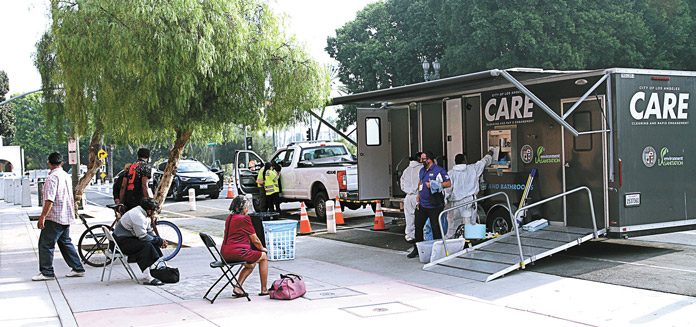
Teaming With Rec and Parks
A couple of months ago we covered Rec and Parks’ Dept. Operations Center with Jimmy Kim, Sonya Young-Jimenez and Brenda Aguirre.
Danie: We know them!
Right. They provided showers for the unhoused, too. How do you interact with them?
Jonelle: We did during COVID.
Danie: When COVID happened, we did not have enough Mobile Hygiene Units (trailers) to assist with the Rec and Parks shelters. We’d been in operation for only about six months. They rented their own trailers, and our personnel staffed them because we are the experts when it came to the sewage discharge and knowing just how to get those units up and running. It was a major challenge because there was a new component that we weren’t familiar with. We know the operation of our vehicles, but we had to learn theirs.
Our personnel staffed the Rec and Parks shower units onsite. We were there from 5 to 9 p.m. providing showers to all these Angelenos who were coming in.
Has that program wound down?
Danie: We’re not doing the Rec and Parks shelters anymore. That dwindled down.
Jonelle: But we still work with Rec and Parks as part of our normal operations, because there are homeless people in the parks.
Danie: Right.
Are you still in COVID operations? Are you doing anything outside of what you were doing before COVID?
Danie: Yes. I make sure that our crews are continuously wearing their PPE, they’re wearing their N95s both in and out of the vehicles. We’re making sure that we’re geared up with the full Tyveks when we’re touching items. We need to make sure that we are healthy so that we’re able to provide these services and don’t have to take a unit out of service due to any type of COVID exposure. As far as that goes, we’re still are in COVID now.
Jonelle: The social distancing has to happen. That’s always on our mind when we’re placing the guests and the personnel.
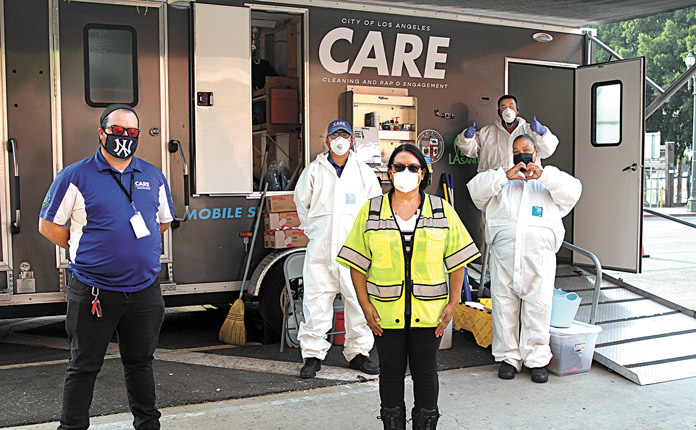
All in the Timing
It was amazing timing, wouldn’t you say, that Mobile Hygiene started just a year ago, and then six months in, there’s the pandemic.
Danie: Yes!
Jonelle: Yes. When we started last year, nobody knew COVID was coming!
Danie: Correct.
Jonelle: I think my life already knows its destiny. I’ve never been put in a wrong place yet, even though a year ago I was geared more toward the Care Teams. I came aboard Mobile Hygiene just a few months ago. Things worked out. We had things in place to get us through COVID.
The Mobile Hygiene Unit was put underneath you as a superintendent.
Jonelle: Yeah. I was put over the Mobile Hygiene Program when I was over the Clean STAT Receptacles and the Care Teams. I had to learn real quick!
Danie, you couldn’t have known that we were going to be in a pandemic.
Danie: Right. Last October (2019) I was stationed at the Unified Homelessness Response Center. In February I was pulled out of that. So it was like, “Here you go. We need you to assist with this Mobile Hygiene Unit Program and bring it to the next level. Incorporate a little more of safety aspects, a little more knowledge and background,” I was able to bring it to the table. The pandemic hit a month later. We were in the process of learning this whole Mobile Hygiene Unit Program and its different components and the areas we service and the individuals, and then we had the pandemic.
Right.
Danie: It was like full gear, full mode, let’s go! It was boots on the ground and we were running. It was a major transition.
Jonelle: We got a lot done.
Danie: Definitely.
Jonelle: There wasn’t a lot of attention put on Mobile Hygiene at the beginning as much as the other Care Teams. But with the pandemic, all of a sudden everybody started wanting the Mobile Hygiene Unit. They went in at warp speed.
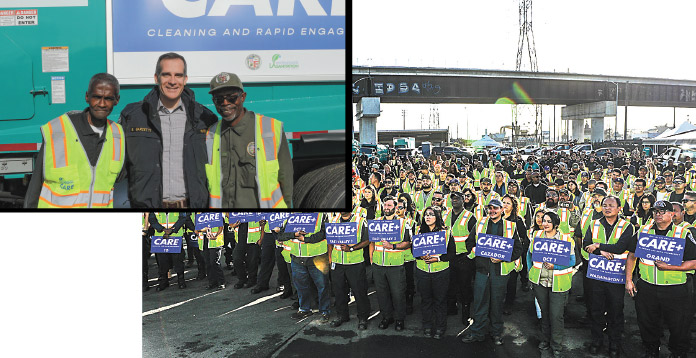
Is there any time in your City career that compares to this?
Jonelle: No. Not for me. Working in Livability Services Div. has been the biggest challenge of my entire career. It’s a new division and there was no foundation laid for it. We got the opportunity to structure it and build on that.
Danie: Definitely agree. This has been by far the most challenging time of my career. There was no foundation laid. We are laying the foundation and building on top of that. There have been a lot of bumps and hurdles, but so far we have done pretty well. The teams themselves are very grateful to be a part of this because they see the impact that it’s making with all the unhoused Angelenos.
Danie, after you came on board, how did you adapt in that first month? When the pandemic hit, what did you do? Did you take a breath? Tell me about that month.
Danie: So luckily with me being at the Unified Homelessness Response Center already, I had an idea of the regional deployment and how that was being done with the Care and the Care Plus Units. But to ramp up and learn a whole new process and a whole new procedure and to get an understanding of some of the wastewater aspects of the job, that was a lot. It was a lot of absorbing, of gathering information, of asking a lot of questions so I had a better understanding of the operation. It was a seven-day-a-week operation. I had to refresh my brain in what we needed so that we could operate safely out in the field and not endanger our staff and not endanger the public. It was a lot of learning.
You learned about PPE?
Jonelle: We had PPE available because all of our Care Teams wear it. We didn’t have to ramp up or dig for that.
Danie: We had to make sure we were following all the guidelines and making sure that we were ensuring the safety of our staff and then everyone else.
Jonelle: We were working a lot when the pandemic started.
Danie: Yes. We were also providing services prior to COVID when the City was experiencing the fires, so we were already functioning.
Jonelle: And we had gone through the typhus outbreak down in Skid Row last year.
Danie: It wasn’t just COVID. It’s any type of emergency that comes up where they need a mobile hygiene unit. We’ve been deployed out to those sites.
Jonelle: Public health is our mission.
It’s a huge growing area.
Jonelle: It is.
Did you have to rewrite your playbook?
Danie: Constantly!
Jonelle: We’re constantly rewriting and updating it.
Danie: A lot of editing.
Jonelle: The more things that become available, the more training that Danie has to provide for her staff.
Danie: It’s always growing.
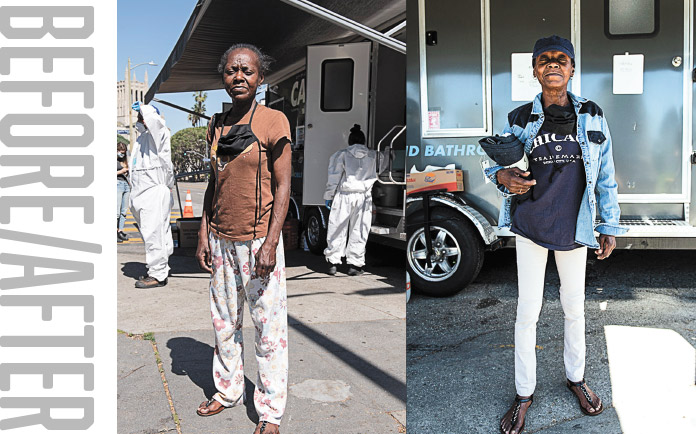
Seeing the Need
How did the mobile unit start?
Jonelle: Generally, it was created because our Care Teams were already out there doing the job tending to the unhoused, and those living on the streets needed showers. Sanitation saw the need to expand our services and worked with the Mayor’s Office to acquire these units and bring them aboard. We’re led by service – our crews were already out there providing comprehensive cleanups of homeless areas. We saw that they need showers and bathrooms. They had basic sanitary needs. That’s how this unit was created.
That simple. You saw the need because you were out there doing the job.
Jonelle: Yes.
Danie: And then COVID hit and there was even more of a need.
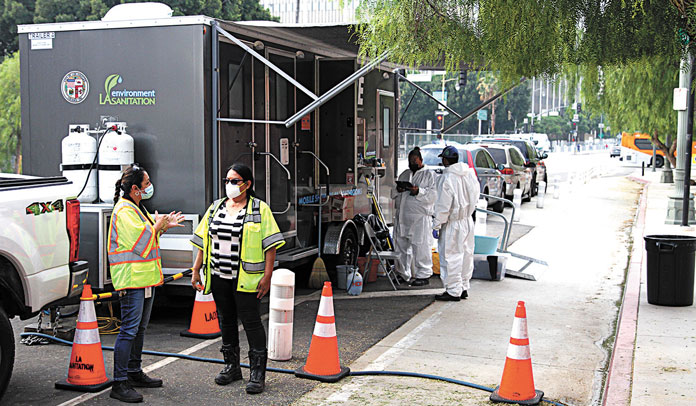
Ramping Up
The Mobile Hygiene Unit celebrated its one-year anniversary last week (Oct. 1), and because of COVID, you’re just getting back to where you where before that – ramping up your services.
Danie: Correct. We’re still learning. We’re still in the process of developing the protocols and making sure that we have the items we need for the crews.
So you’ve seen a lot of growth then in a year.
Jonelle: From one trailer, to six. And by the end of the year we’ll have 13 trailers in the field. We have two more on their way this week from New York where they’re made.
You two helped design the new trailers.
Jonelle: Yes, we did. To get us off the ground, we bought what was available to us last year. And they’ve been okay. But Danie and I have learned a lot over the past year about what would make them better. We worked with the factory to improve our new trailers that they’re building. They’re going to be really good.
And those are improved standards that everybody in the country will be able to put to use in their cities.
Jonelle: Yes, exactly, if they want them.
Danie: And remember too that we serve not just those who are unhoused or on the streets. We also serve the individuals in RVs. That might be their form of housing, and we take Mobile Hygiene units to locations that are condensed with any type of RVs at the sites. Council District 2 is looking for a location where we can provide services because they have 25-plus RVs at the site that may need assistance with showers and some type of sewage discharge. Just anything.
What other City departments do you work with to help deliver your services, whether it’s tapping into hydrants or pumping sewage?
Danie: I would say the DWP because we need the hydrant access. Wastewater, of course, is within Sanitation. That’s Sanitation-driven.
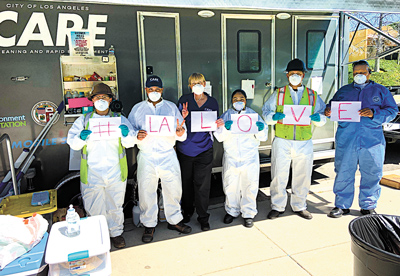
Jonelle: We partner with the DWP and our Wastewater Division. Urban Alchemy has been influential in providing the hospitality services that the MHU program needs. They are the first face a guest sees inside this program. We really could not have done it without any of our partners.
Urban Alchemy is an outside organization.
Jonelle: Yes.
In terms of the City employees, how many people are in the unit that manages the six trailers that you have?
Danie: We’re small. We’re about a 20-person team.
Where do you shelter your trailers?
Danie: We have three locations – two trailers at the Washington Yard, two here at the Cazador Yard, and two that at the Valley. So we’re trying to regionally deploy so that there aren’t too many crossings. I believe eventually we will add a couple more. There’ll be a few at the Harbor and a few at the Tillman Yard. They’re all going to be regionally deployed throughout the City.
How are they funded?
Jonelle: Through our general fund.
Do other cities look to LA about what we’re doing? Are we seen as a leader in any way?
Jonelle: Yes, we are. They are looking to us. We are one of the first cities in the United States to have a program this big. This is with six, and we’re going to 13.
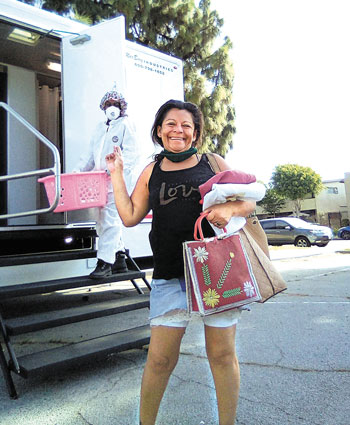
Providing Dignity
What do you wish people knew about what you do?
Danie: I think people are surprised. We have been to some locations where there are unsheltered individuals, and sometimes the residents that are in the area don’t want to see that because they think that it’s attracting individuals to the site. But they already exist there. We’re just trying to provide them a hygienic place with whatever services they need, whether it’s restrooms, showers, sometimes clothing if we have clothing, toiletries or tents. I wish everyone were a little more accepting that we’re here to help and not to harm.
You’re not creating the need, you’re addressing the need.
Jonelle: I wish people knew that it was more than a shower and a bathroom. It provides our unhoused Angelenos with some dignity. When you see them come out of a shower with fresh new clothes, it can be powerful. If there are families there, we have backpacks made for the children, and it makes them feel they have some dignity and are whole again when they step out. And then we’re back again the next day like we said we were going to be.
What do you love about what you do?
Danie: Seeing the staff being proud. They know some of these unhoused individuals by names. We have conversations with people, and the feedback we’ve gotten from the individuals using the showers is just amazing. They’re nothing but grateful. They’re happy that we’re on site. They’ll ask us when are we coming back. And sometimes we actually have individuals lining up to take showers because they know that we’re coming.
Jonelle: At some of our regular locations like Glendale, I can see the ones who are there twice a week and they’re showering with us consistently – they’re cleaner, they feel whole and they’re looking for jobs. Some of them got into housing and they come so excited and say, “I got into housing.” We see that. They don’t have to look dirty; they don’t have to feel dirty.
That’s hope.
Danie: Right.
Jonelle: Hope, exactly. They don’t have to live like that. It just takes time. Our partner Urban Alchemy has services available that we can connect them into, too.
Do you see that difference, Danie, in people when they are respected and shown dignity?
Danie: Definitely. Sometimes when we go out to a location the first time, individuals are really reluctant because they don’t know why we’re there, they don’t know how much it costs and what services are available. But they get used to us being there, and they start referring their friends to our services. We can see the difference in people. It lightens them up.
They trust you.
Jonelle: It’s a trust. It’s a relationship.
Danie: You have to build that trust.
Jonelle: We’re hoping to add medical services next year if we get the funding. It will help with their infections before going to an emergency room.
The future is promising.
Danie: It’s definitely exciting, yes. A little challenging, but definitely exciting!
Jonelle: It sounds good, but the planning that goes into that is hard work.
Jonelle and Danie, thank you for your time.
Jonelle: Yes, of course.
Danie: Thank you.
BEHIND THE SCENES
Club Director of Marketing Summy Lam photographs one of Public Works’ Mobile Hygiene Unit teams (from left) Danie Maldonado, Marsail Johnson, Isaak Flores and Jonelle Gardea at Sanitation and Environment’s Cazador Yard in Glassell Park. |


